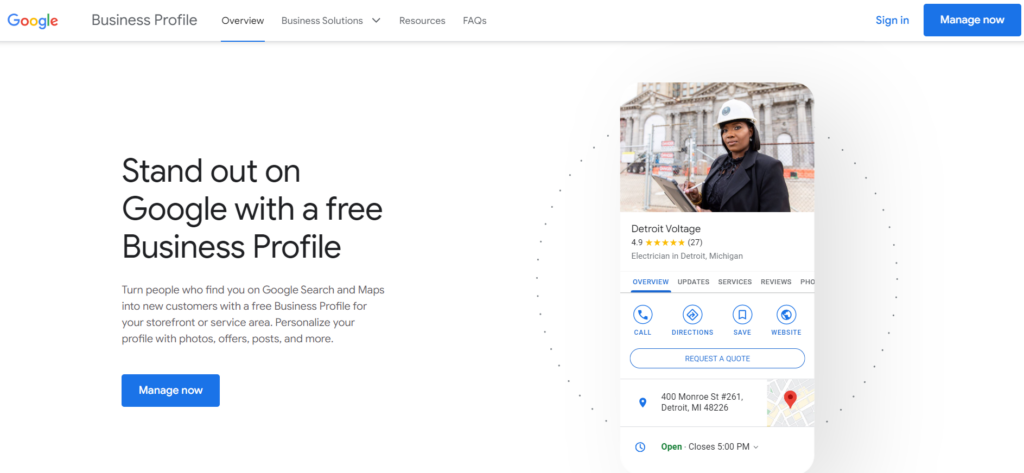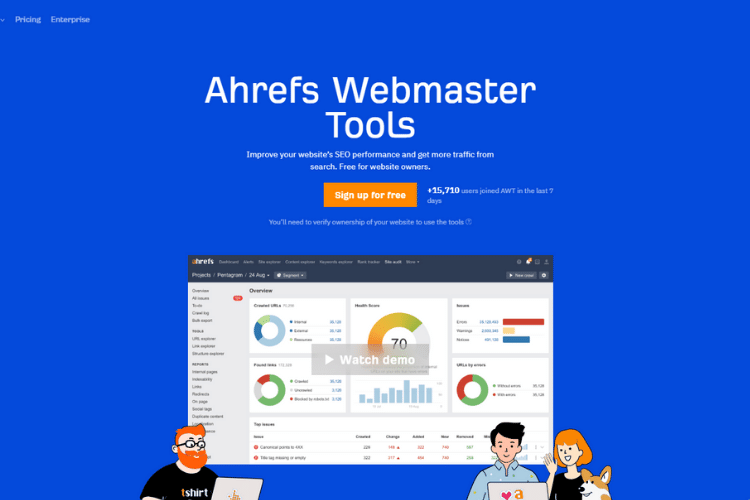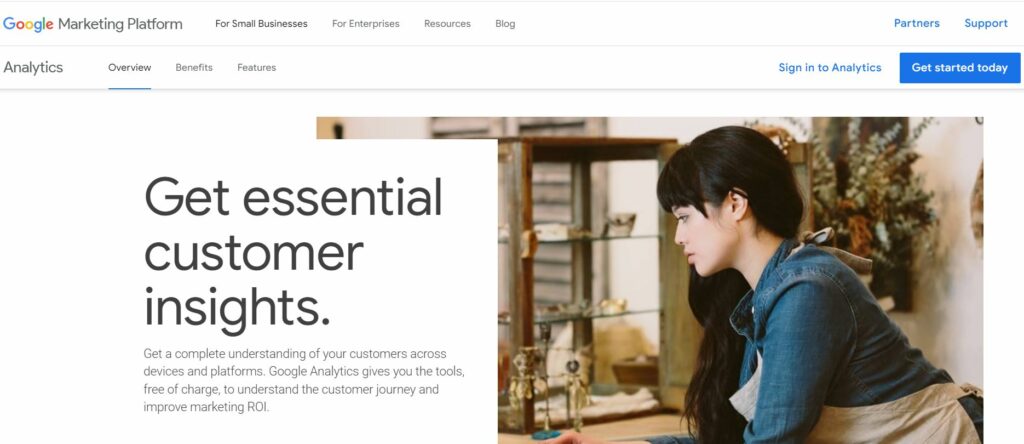Are you tired of seeing everyone else draw people to their practices using the internet while your dental practice seems to be invisible? What could you be doing wrong?
As someone who has been involved in the intricacies of trying to market yourself on the internet for several years now, I know how frustrating it can be to feel invisible. However, there are some things you can do to improve your online presence and draw more leads.
You need to improve your SEO (search engine optimization). This is where you optimize your website so that search engines like Google understand what you are and who to show your business to.
SEO for dentists is incredibly important in marketing your practice to potential clients looking for somewhere online.
Let’s delve into the intricacies of SEO for dentists like you so you can start building a solid marketing strategy.
Interested in SEO as a career? Check out this article.
What is Dental SEO Marketing
As I briefly mentioned above, SEO is the process of optimizing your online presence so that the right target audience can see you. The main goal of Search Engine Optimization is to improve your visibility on the search engine results page (SERPs.)
You will do this mainly by including certain keywords to ensure that you show up when certain queries are typed into the search bar.
For more information, check out this article on how to do SERP analysis.
Why is SEO for Dentists Important?
Just imagine you have typed a question into the search bar. How often do you scroll down past the first few results? How often do you go to the second page of results?
The answer is likely that you do this very rarely, if ever.
The higher you rank, the more likely it is that prospective patients will find your practice.
However, you don’t want to be ranked for the wrong things. If this happens, then your ranking will be useless. Imagine you are a dentist in North America, and someone in Europe finds you when looking for dental services. That’s useless.
SEO can help dentists like you rank higher and for the right people. Targeting people in the right area is referred to as local SEO.
This also results in several things. First, it is a very cost-effective marketing strategy. You do not need to pay Google to rank if your SEO is good. So you reach more people for less money.
And secondly, it helps you build trust and credibility. Ranking higher makes you seem more trustworthy. This means that your conversion rates are likely to increase.
Key Strategies for Dental SEO
So, now that you’ve got some idea about what SEO is about and how it can help you with more leads by increasing your visibility to all of the right people let’s look at some simple strategies that you can do to improve your SEO and find potential patients.
For more information, check out my ultimate SEO checklist.
Update Your Information on Google Business Profile

The first thing you need to do in order to implement a successful dental SEO strategy is to update your information on Google Business Profile.
Formerly known as Google My Business, Your Google Business Profile needs to contain all of your information. This includes things like your address, phone number, business hours, and website URL.
This information will help you improve your local SEO and target potential patients in your area.
Having a Google Business Profile means that you will appear on Google Maps. This is great for people looking for a dentist in a specific area. You may even benefit from additional exposure when people look up the location of another dental office.
However, appearing on Google Maps is not the only benefit. You will also increase the chances of getting a Google Knowledge Panel. That’s the feature that pops up on the right-hand side of the search results and contains all the information included in your business listing.
Best of all, creating a Google Business Profile is completely free! For an in-depth look at setting up your Google My Business Profile, check out this article.
Use Structured Data on Your Website
When you implement structured data markup, such as Schema.org, on your dental practice website, you’re essentially providing search engines like Google with additional information about your business in a structured format.
This is similar to a Google Business profile, as it includes details like your business name, address, phone number, and operating hours. However, it goes further, even including specific services offered.
If you are using WordPress, you can try the SEO plugin Rank Math SEO. It requires no coding and can be used for the structured scheme.
By doing this, you’re helping search engines better understand the content of your website and its relevance to users’ search queries. This, in turn, can lead to your website appearing in more prominent positions in search results, attracting more qualified traffic to your site.
For more information on search intent, check out this article.
List Your Practice in Reputable Online Directories
You can expand your online visibility by listing your practice in reputable online directories such as Yelp, Healthgrades, and Vitals. Even the Yellow Pages will do.
Online directories such as these can also help improve your SEO. This is done by providing more valuable backlinks, which provides you with more referral traffic and means that search engines see you as more trustworthy and reputable, ranking you higher.
Encourage Patients to Leave Positive Reviews
Customer reviews can significantly impact your practice’s online reputation. It is indirectly a ranking factor, so more positive reviews mean higher rankings.
Encourage satisfied patients to leave online reviews on platforms like Google, Yelp, and Facebook.
Responding to patient reviews, whether positive or negative, shows that you value patient feedback and helps build trust with potential patients.
Demonstrate Experience, Expertise, Authoritativeness, and Trustworthiness
Establish yourself as a trusted authority in the dental field by creating informative and engaging content on your website. This could include blog posts, videos, infographics, and patient testimonials that showcase your expertise and experience.
It is a great idea to collaborate with other detail practices or orthodontists. In doing so, you will cement your credibility. If other medical professionals are willing to support you and work with you, then you must know what you are doing.
And the more content you have, the more likely you are to rank for search queries, increasing your overall visibility.
Optimize Your Webpages with On-Page SEO
By optimizing your web pages with on-page SEO, search engines will know what your content is about and when to show it to people. Do this by optimizing your website’s meta titles, meta descriptions, headings, and content with targeted keywords to improve your search engine rankings.
Make sure your website is user-friendly, mobile-responsive, and optimized for speed. This will improve the overall user experience and keep them on your website a lot longer.
Perform Keyword Research and Local Keyword Research
You need to identify relevant keywords and phrases that potential clients are likely to type into a search bar if they are looking for dental services in your area.
You can make use of a couple of different tools, which we will discuss below. The goal is to find keywords that do not have a lot of competition but have a fair monthly search volume.
That way, you can easily rank at the top of the page for those search phrases. An easy way to get started without tools is to look at your competitors and see what they are doing. What works for them will likely work for you, too.
Check out this article on how to see a website’s keywords for more information.
Conduct a Technical SEO Audit
A technical SEO audit involves thoroughly examining your website for any technical issues that could affect its performance in search engines.
This includes checking for broken links, duplicate content, slow page loading speed, and other factors that could negatively impact user experience and search engine rankings.
By regularly auditing your website and addressing these technical issues, you can improve its overall performance, make it more user-friendly, and ultimately achieve higher SEO rankings, resulting in increased visibility and traffic.
Check out this article for a deeper look at the difference between technical, on-page, and off-page SEO.
Build Backlinks from High-Quality Websites
Backlinks are links from other websites that point to your website. When reputable websites in the dental industry, local community organizations, or news outlets link to your site, it sends a signal to search engines that your website is trustworthy and authoritative.
This can positively impact your organic rankings and increase your website’s visibility in search results. However, it’s essential to focus on obtaining backlinks from high-quality and relevant websites, as low-quality or spammy backlinks can actually harm your SEO efforts.
Measure Your SEO Metrics
Monitoring key metrics such as organic traffic, keyword rankings, and conversion rates is crucial for evaluating the effectiveness of your SEO efforts.
Tools like Google Analytics and Google Search Console provide valuable insights into how users are finding and interacting with your website through organic search.
By analyzing these metrics regularly, you can identify areas for improvement, track the impact of your SEO strategies, and make data-driven decisions to optimize your website and attract more prospective patients to your dental practice.
For more information, check out this article on how to use Google Search Console for SEO.
Enhancing Dental SEO with Tools
Now that we have discussed some key strategies that you need to understand when it comes to dental search engine optimization let’s look at some of the tools that can help you optimize your content marketing and reach your target patients.
Enhance Your SEO with Keyword Research Tools
Keyword research is a crucial aspect of improving your dental SEO. Doing keyword research will help you identify phrases that your potential patients may type into the search bar.
However, thorough keyword research will also prevent you from wasting time trying to target keywords that are very difficult to rank for.
There might be hundreds of dentists targeting the keyword ’emergency dental surgery.’ Although it is a good thing to include this keyword if you offer this kind of surgery, you might find there is a lot less competition for ’emergency crown replacement surgery.’
Keywords like this are called long-tail keywords. If they have relatively low competition but a high search volume, they are like low-hanging SEO fruit, ready to be plucked from the dental SEO campaign tree.
On Ahrefs, I can see that the keyword ‘dental implants’ would be very hard to rank for. However, the long-tail keyword ‘cost of full mouth dental implants’ is a low-hanging fruit that could be targeted to attract a potential dental patient with this issue.
Keyword research tools such as Google Keyword Planner, Semrush, and Ahrefs allow you to discover relevant keywords, analyze search volume and competition, and identify opportunities to target high-traffic keywords related to dental services.
By leveraging these tools, you can optimize your website’s content with the right keywords to improve its visibility in search engine results and attract more qualified traffic from your target audience.
SEO Link Building for Dental Websites

Link building is another essential part of SEO. This is because if a reputable site links to your business page or maybe your blog content, the search engine algorithm will view you as more credible, and your domain authority will increase.
This means that the backlinks will help you rank higher.
It is also important to build internal links. This will help your users move through your website and find more helpful content. If they interact more with your website, this will be seen as highly positive, and your ranking will improve.
Tools such as Moz Link Explorer, Ahrefs, and Majestic can help you identify potential link opportunities, analyze your competitor’s backlink profiles, and track the quality and quantity of backlinks pointing to your website.
Some tools may even help you remove backlinks from shady sites that may reduce your credibility and authority.
SEO Analytics and Reporting

The best way to stay on top of your dental SEO game is by keeping an eye on your analytics. This means that you can easily see how small changes influence your site.
There are many SEO tools that can help you track key performance indicators (KPIs) by creating heatmaps and other forms of reporting.
Google Analytics, Google Search Console, and Semrush are all great options. Some reporting tools are definitely easier to use than others, though. So make sure to experiment and find one that suits your needs.
Check out this article on ten alternatives to Google Analytics to see which tools may work best for you.
How to Optimize Your Dental Website for SEO
1. Optimize Your Website Structure
Optimizing the structure of your website is incredibly important. You need to ensure that your structure is optimized for user experience as well as for search engines to navigate or crawl.
Here are some easy-to-implement techniques you can use:
- Include navigation menus
- Use descriptive page URLs
- Link internally
All of this will help users move around your website and easily find what they are looking for. And it will help search engines crawl your website and do the same.
2. Create High-Quality Content
You can have done all of the keyword research in the world, but it will not help you if you don’t create high-quality content.
You need to address questions or concerns that you are dealing with thoroughly. Whether you are creating blog posts, articles, videos, infographics, or any other type of content, make sure that you put in the time and effort to do it properly.
Carefully consider who your target audience is for each piece of content, and make sure that it is helpful to them and easy to understand.
You may want to consider content pruning occasionally.
3. Mobile Optimization for Your Websites
Most of the time, when you are setting up your website, you will be doing so on a personal computer. But, it is important to remember that the majority of people using the internet will do so on a mobile device.
You need to make sure that your website is optimized for mobile searches. A mobile-friendly site should be able to work well on multiple screen sizes.
You should also optimize the page loading speed, make sure you can tap on any buttons easily, and anything else you can think of to make the browsing experience smooth and intuitive on mobile devices.
Keep in mind that most search engines, such as Google, prioritize mobile-friendly sites.
Local SEO for Dentists
It is very important that your local SEO is optimized so that you can attract patients from your local area who are actively searching for dental services.
How to Optimize Your Dental Practice for Local SEO
Local SEO for dentists begins with crawling and indexing. You need to start by submitting your website and content to search engines.
By doing so, the search engines will cover your content and ensure that it is understood.
I would like to do this by submitting my information to Google Search Console since Google has a large market share when it comes to online searches.
You also need to optimize your information by making sure that your location is included, not just on your website but on all social media platforms and your Google My Business. Make sure that your information is consistent so there is no confusion.
If there are variations of the area names around you, make sure to include them all throughout your content and pages.
For example, you might be a dentist in the Skokie community. Skokie is a municipality just north of Chicago, but because it is so close, this area can also be referred to as the Chicago North Shore area. You may want to consider including both search terms.
Monitoring and Evaluation
Monitoring and evaluation of your dental practice website is very important to make sure that you are on the right track. There are some tools that you can utilize to evaluate certain KPIs, as mentioned above.
But these tools are no good if you don’t know what you are looking for. Here are some KPIs that you should be keeping an eye on.
Organic Traffic: The amount of traffic coming into your website from search engines. This includes the number of impressions you make, as well as your click-through rate or the percentage of people who see your website who actually end up clicking on it.
Keyword Ranking: You should start ranking for keywords fairly soon after you have implemented some SEO techniques. It is important to keep an eye on your search rankings to see if they improve over time.
Bounce Rate: This is the percentage of visitors who only view one page before leaving your website. If your bounce rate is high, it might mean that visitors aren’t finding what they are looking for or they can’t navigate with ease.
Conversion Rate: this is the number of website visitors who fill out a form or contact you through an email or phone call to book a consultation. Essentially, it is the number of people that actually turn into patients.
Join 900+ to receive a weekly SEO video from my YouTube channel, which I’ll share, and an actionable SEO tip every week.
Wrap-Up
In this article, we’ve looked at a lot of different aspects of SEO for dentists. SEO is a great tool to utilize to make sure that you show up in search and get the most conversions.
Although SEO can be quite overwhelming, you can start with the basics today. Set up your Google My Business and get your website submitted to Google Search Console so it shows up on Google. These simple SEO tactics are plenty to start off with.
After that, start creating relevant content to target some dental keywords. Make sure that you keep an eye on your KPIs as you implement the techniques discussed. That should show you if you are on the right track.
For more information on SEO, sign up for my newsletter to keep up to date on the latest news and changes.
FAQ
Does Google Ads work for dentists?
Yes, Google Ads do work for dentists. With targeted ad campaigns, you can reach potential patients actively searching for dental services on Google. Set your budget, target keywords, and track ad performance for maximum ROI.
Do dentists need marketing?
Absolutely, dentists need marketing! Marketing is essential for attracting new patients, retaining existing ones, and growing your practice.
Whether through online channels like SEO and social media or traditional methods like referrals, effective marketing helps dentists stand out and build trust.
How do dentists get leads?
Dentists can get leads through various channels. Optimize your website, implement SEO, engage on social media, run Google Ads, encourage referrals, network with other professionals, and participate in community events to attract new patients.
Should You Hire a Dental SEO Professional?
It can be beneficial to hire a dental SEO professional. SEO can be very complex and search engine algorithms are changing all the time. By outsourcing your SEO efforts to a professional dental SEO company, you can save time and resources.
Although it can be pricey to hire dental SEO experts, the return on investment is generally worthwhile.


